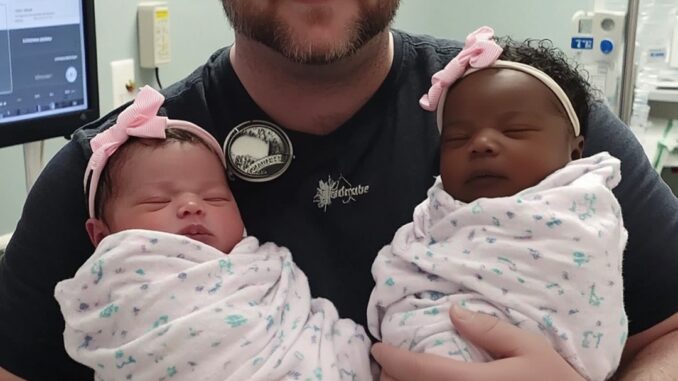
When I arrived at the hospital to bring home my wife and newborn twins, I expected a day of joy and celebration. Instead, I was met with devastation. Suzie, my wife, was gone, leaving behind only a cryptic note. As I cared for our daughters and sought answers, I uncovered secrets that threatened to shatter everything I thought I knew.
The balloons swayed gently in the passenger seat as I drove to the hospital, my chest swelling with anticipation. Today was the day I brought my girls home—my wife, Suzie, and our two perfect newborn daughters. I imagined Suzie’s face lighting up as she saw the nursery I’d prepared, the photos I’d framed, and the dinner I’d painstakingly cooked. After everything she’d endured—morning sickness, swollen feet, and the unsolicited advice from my overbearing mother—she deserved nothing but happiness.
When I arrived, I rushed past the nurses, beaming, and burst into her room, balloons in hand. But instead of finding Suzie waiting for me, I found an emptiness I couldn’t comprehend.
The babies slept soundly in their bassinets, but Suzie was gone. On the nightstand was a note scrawled in her handwriting. My hands trembled as I unfolded it.
“Goodbye. Take care of them. Ask your mother why she did this to me.”
The words hit me like a blow. My mind raced. What did this mean? What had my mother done? I struggled to breathe as a nurse entered with discharge papers. She froze at the sight of me.
“Where’s my wife?” I asked, my voice cracking.
The nurse hesitated. “She… left this morning. She said you knew.”
But I hadn’t known. I knew nothing at all.
I brought my daughters home that day in a daze, clutching the note as if it might explain Suzie’s disappearance. My mother, Mandy, was waiting on the porch, casserole dish in hand, her smile radiant as she cooed over her granddaughters.
“Let me see them!” she gushed, reaching for the car seat.
I stepped back, my voice sharp. “Not now, Mom. We need to talk.”
I shoved the note into her hands. Her face blanched as she read it, and for a moment, I thought she might faint.
“Ben, I don’t know what she’s talking about,” she stammered. “Suzie… she’s always been sensitive. Maybe this is just—”
“Don’t,” I interrupted, fury bubbling to the surface. “Don’t pretend you don’t know. You’ve always criticized her, always found ways to tear her down.”
“I only wanted what’s best for you,” she said, her voice trembling. “She wasn’t right for you—”
“Stop!” I roared. “She was my wife, the mother of my children. Whatever you did, it drove her away. And now I’m left to pick up the pieces.”
That night, after the twins were asleep, I sat at the kitchen table with Suzie’s note in one hand and my mother’s excuses echoing in my mind. I couldn’t shake the suspicion that there was more to the story, so I started digging.
In a box tucked away in the closet, I found a letter written in my mother’s handwriting. It was addressed to Suzie, and as I read it, my heart sank.
“You’ll never be good enough for my son. If you care about him and those babies, you’ll leave before you ruin their lives.”
The room spun as the truth came crashing down. My mother hadn’t just undermined Suzie—she’d actively pushed her to the brink. I confronted her immediately, rage boiling over. Her excuses, her tears—they meant nothing to me. I told her to leave and never come back.
But even after she was gone, Suzie’s absence was a gaping wound. Weeks turned into months as I cared for Callie and Jessica, balancing diapers and sleepless nights with a relentless search for their mother. Suzie’s college friend Sara finally admitted the truth: Suzie had confided in her about the cruel things my mother had said, about feeling trapped and unworthy.
“She didn’t think you’d believe her,” Sara whispered. “She thought your mom would turn you against her.”
Months later, a text from an unknown number reignited my hope. It was a photo of Suzie holding our daughters in the hospital, her face weary but serene. The message read: “I wish I was the mother they deserve. I hope you forgive me.”
I tried calling, texting back—nothing. But the photo gave me a glimmer of hope. She was alive. Somewhere, she was trying to heal.
A year passed. On the twins’ first birthday, there was a knock at the door. I opened it to find Suzie standing there, clutching a small gift bag, tears streaming down her face.
“I’m so sorry,” she whispered.
I pulled her into my arms, holding her tightly as she sobbed. Over the weeks that followed, she shared her story—how postpartum depression, my mother’s words, and her own self-doubt had driven her to leave. Therapy had helped her rebuild, step by step.
“I didn’t want to go,” she confessed one night, sitting on the nursery floor. “But I didn’t know how to stay.”
I took her hand, my voice steady. “We’ll figure it out. Together.”
And we did. It wasn’t easy—healing never is. But with love, forgiveness, and the laughter of our daughters filling our days, we rebuilt what had nearly been lost.
Leave a Reply